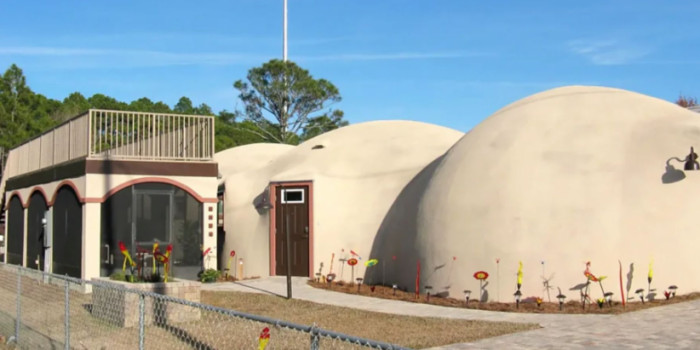
These Florida Domed Homes Have Survived Category 5 Hurricanes

As Florida has been hit by several devastating hurricanes, homes designed to withstand these extreme storms have gone through a serious test.
In 2018, Hurricane Michael made history, becoming the first category five hurricane on record to make landfall in the Florida Panhandle. It caused widespread destruction and damage, sweeping entire buildings off their foundations, and impacting almost 50,000 structures.
But in a small gulf-front community in Mexico Beach, Florida, something unexpected could be seen amidst the chaos. One home, an unusual caterpillar-like dome-shaped structure, remained standing, barely touched by the 160mph (260km/h) wind speeds. The home, called "Golden Eye", belonged to Margaret Clayton, who had designed and built the house in 2015 with a construction company called Monolithic Domes. Clayton's neighbor's house "exploded", sending a transformer flying into her house and smashing into the wall. "All the homes around me were destroyed or uninhabitable," she says. Golden Eye, meanwhile, remained intact.
"The wow factor comes when you see those photos," says Landolf Rhode-Barbarigos, an associate professor in the University of Miami's civil, architectural and environmental engineering department and associate director of the Climate Resilience Institute. "Total destruction next to a dome house that's still standing. It's quite impressive."
In the US, hurricanes cause more death and destruction than any other extreme weather event. Since 1980, there have been 363 billion-dollar weather disasters in the US, and hurricanes have caused the most damage – more than $1.3 trillion (£993bn) in total, with an average cost of $22.8 billion (£17.4bn) per event. As of 2023, they had caused 6,890 deaths.
With hurricanes rapidly becoming more intense due to climate change – and even category one storms being capable of causing severe damage – building storm-resilient homes is becoming increasingly important.
"This type of [climate-resilient] architecture combined with the right engineering solutions could save lives in the face of extreme weather," says Rhode-Barbarigos. "We need to explore building more climate-resistant structures because we know that certain forms are better for certain environments."
Surviving against the odds
There are several construction companies turning their attention to domed and rounded shapes. It's something American construction company Deltec has focused on for the past three decades in their efforts to build hurricane-resilient homes. Of the 5,500 domed and rounded homes the company has constructed, only one has sustained damage from high winds, according to Deltec's records, despite facing some of the country's most powerful hurricanes on record, including Irma, Michael, Katrina, Dorian and, most recently, Milton. Deltec says it has heard from dozens of homeowners and none have reported damage from Hurricane Milton.
Interest in the company's domed houses has grown in recent years, says Deltec president Steve Linton. "Hurricane-resistant design is not a unique idea, but the reality of ensuring that your home was properly engineered with the right connections and design considerations is a significant challenge. Most architects don't design round houses." Builders also may not be able to construct them using their usual methods, he adds. "The conventional approach to making a home hurricane resistant is to take a traditional home design and reinforce it. It is like trying to make a race car out of a school bus – they really are just two completely different [things], and a home is no different."
A circular shape means the home is more aerodynamic, with Linton claiming the round design leads to significantly less pressure building up on the outside of the home. The design means the home can absorb and distribute the energy better than a traditional house, regardless of the direction of the wind force, he adds. "This works much like the spokes on a wheel," Linton says.
The domed form also has an advantage, Rhode-Barbarigos explains, because the homes don't resist the flow of the wind around them. "A regular house with edges like a box, and a flat roof, that creates a certain obstacle to the flow of the wind," he explains. "When you have a house that's round, by default it receives less force from the wind. It's not only the engineering but also the architecture that can affect the [wind] load.
"[These homes] are resistant. They're not affected by the strong winds that we have with hurricanes," says Rhode-Barbarigos.
Deltec also builds with Southern yellow pine, wood that is stronger than other lumbers commonly used, such as Douglas fir. The structure is also precision engineered and built in a factory. "Because we're building in a controlled environment, we're able to get levels of quality control that aren't easily achievable on site."
Deltec has built homes in all 50 US states and in more than 30 countries around the world. "You need resilient homes to adapt to the changing world we find ourselves in," Linton says.
In the past, Deltec houses were only available in custom designs. A new line of pre-designed models are "hurricane ready", designed to withstand wind speeds up to 190 miles (307km) per hour, and 25% cheaper than the custom builds. Deltec provides the "shell" of the house, while the site prep, roof shingles, insulation and drywall are completed by the buyer's own builder. The shells cost, on average, one-third of the total house cost, and ranges from $45,900 (£35,000) for a 515 sq ft (48 sq m) home to $132,500 (£101,000) for a 2,070 sq ft (192 sq m) home.
More than one way to build a dome
But Deltec isn't the only company building rounded homes.
The first Monolithic Dome structure was built in 1976, as a potato storage unit in Idaho. Now the domes can be found across the world, from the Arctic to the tropics.
"The interest in domes fluctuates," says Gary Clark, a board director at Monolithic Domes, who was initially hired to spray polyurethane foam on another potato storage dome in Idaho in the 1980s. Clark now leads Monolithic Dome-building workshops in Texas – and lives in his own domed home in Michigan. "The growth hasn't been stupendous, but it's been consistent. The trend is catching on. We notice more and more interest in residential domes as opposed to commercial, the residential market seems to be heating up a bit more lately."
Monolithic's buildings are constructed not from wood, but from concrete and steel, starting with a circular ring beam on the floor of the structure. Then an air form membrane made of PVC-coated fabric is attached to the ring beam and inflated to create the shape of the structure. Closed-cell polyfoam – known for its strength and water resistance – is applied to the interior, and steel reinforcement is attached to the foam surface, which is then sprayed with layers of concrete known as shotcrete.
"We don't think the price of a dome is much different than that of a standard custom home," says Clark. But over the long term, Clark says a domed home can be cheaper once maintenance, operation, longevity and insurance costs are factored in. The domes can also be very energy-efficient, Clark claims, potentially saving owners a considerable sum. However, "most folks only consider constructions costs", says Clark.
There are other challenges to an unconventional design too. "One of our biggest hurdles is getting banks to see the advantages and allow people to take out mortgages for the Monolithic Dome," says Clark. "It is difficult to find financing. It is not impossible, but it is definitely not as easy as a stick-and-brick home."
The domes aren't completely disaster-proof. Debris carried by winds can damage the surface membrane – which happened to Monotholic Dome homeowner Margaret Clayton. Although one dome in Port Arthur, Texas, was hit by three hurricanes and emerged unscathed, according to Monolithic's records.
The Devil's In The Detail
Both approaches, by Monolithic Domes and Deltec, have their advantages in dealing with high winds, says Rhode-Barbarigos. But they're not the only approach to extreme weather resiliency – and wind is just one risk a hurricane brings.
"Architecture can play a big role depending on what the extreme weather is," says Elizabeth Plater-Zyberk, professor of architecture and director of University of Miami's urban design programme. "There's certainly more attention being paid to designing buildings to be resilient and climate adaptable."
"There are two issues during a hurricane, wind and flooding," Plater-Zyberk explains. In fact, the greatest threat to life a hurricane brings comes from water, not wind. "Any shape of building that's on the ground and receiving flooding is not going to help you. So if you build a dome on, say the Houston or Louisiana or Miami coast, it would have to be on stilts to stay out of the flood. Homes I've seen that have survived well in hurricanes are the ones that are raised high above the ground and fortified," says Plater-Zyberk.
No domed home can be called "hurricane-proof", says Plater-Zyberk. But how resilient a house is "really depends on the materials it's made of", Plater-Zyberk adds. "If you just say, 'All you have to do is get a home that's in the shape of a dome and you'll be fine,' that's absolutely not true."
A traditional-shaped house can still be wind-proofed, though – by adapting the "envelope", essentially the shell of the house. An infamous image from Mexico Beach, Florida, in 2018 showed a neighbourhood largely flattened by Hurricane Michael – with one of the few exceptions being a three-storey house, which stood on stilts and was constructed with concrete.
The envelope is the key characteristic, Rhode-Barbarigos explains, and needs to be structurally tight. "You don't want an opening on your envelope because all your wind will go in there. You have all this enormous pressure coming from the inside and that's why you see the roofs flying off. So it's very important to maintain the integrity of the envelope."
The connections on the load path – where the weight of the structure is transmitted into its foundation, and then the ground – are important too. Strong connections throughout the house means there is no weak point. But all of this, as Rhode-Barbarigos points out, "is associated with a certain cost".
To help ensure houses are more resilient in general, it's imperative that building codes – which are primarily set by states and dictate minimum standards on how structures should be built – are kept up to date, says Plater-Zyberk. The building and zoning codes respond to extreme weather impacts, and influence how homes are designed. And the stricter the code, the stronger the housing. Florida has some of the most stringent codes in the country due to its extreme weather.
"When we worked in Hurricane Katrina, the houses that were standing were the ones that had followed the Florida code, even though they were in Mississippi," Plater-Zyberk says.
Rhode-Barbarigos believes the reason there aren't more domed homes – or other structures adapted to hurricanes – comes down to two reasons. The first is cultural traditions – we're used to living in houses that look a certain way, and it takes time to change mindsets. The second is the cost.
"From an engineering aspect, we do know how to construct buildings that can sustain extreme winds. The technology is there. The question is the application of the know-how. The real problem is not from the engineering side, it's the cost. Who can afford it? And if we can afford it, what's the scale? What do we do with the existing infrastructure?”
Perhaps, he says, the answer is some place in the middle.
"Maybe the key for a more affordable house lies somewhere between exploring those geometries and technologies with other design ideas."
Written By: BBC.com





